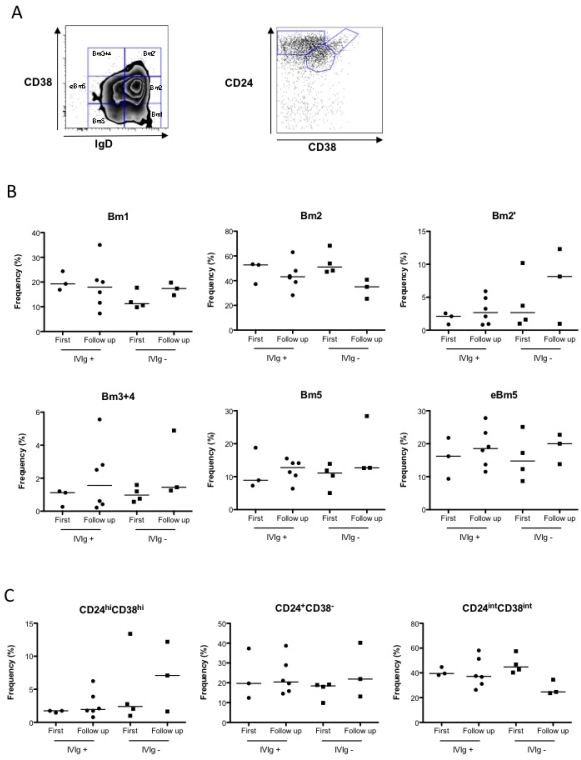Intravenous Immunoglobulins Failed to Prevent Acute Antibody-Mediated Rejection in Kidney Transplant Recipients with De Novo DSA within the First Year After Transplant.
1Nephrology-Transplantation, APHP, Henri Mondor, Créteil, France
2INSERM U955, Créteil, France
3Public health, APHP, Henri Mondor, Créteil, France.
Meeting: 2016 American Transplant Congress
Abstract number: A109
Keywords: Alloantibodies, B cells, Gene expression
Session Information
Session Name: Poster Session A: Kidney Desensitization
Session Type: Poster Session
Date: Saturday, June 11, 2016
Session Time: 5:30pm-7:30pm
 Presentation Time: 5:30pm-7:30pm
Presentation Time: 5:30pm-7:30pm
Location: Halls C&D
Background
Around 25% of kidney transplant recipients develop de novo anti-HLA donor specific antibodies (DSA). Most of them are detected within the first year after transplant. Incidence of clinical or subclinical acute antibody-mediated rejection (ABMR) reaches 30% in patients with de novo DSA. No preventive treatment is currently recommended.
Methods
We conducted a prospective study to evaluate high doses IVIG (2 g/kg every month during three months) to prevent ABMR in kidney transplant recipients with de novo DSA within the first year after transplantation and normal allograft histology at the time of the de novo DSA. A follow-up biopsy was performed in all patients. At each point (inclusion and follow-up) both transcriptional profile and phenotypic characterization of peripheral B cells were performed by real time PCR and flow cytometry, respectively.
Results
Eleven patients were treated and seven were not. At the time of de novo DSA, both groups were similar. IVIG failed to prevent ABMR with two episodes in IVIG group after 4 and 7 months and one episode in no treatment group after 10 months. We could not individualize any beneficial effect on class I and class II DSA with comparable median number, highest MFI and sum of MFI between both groups at the end of the follow-up (9 (7-10) months). Analyze of B cell subsets by flow cytometry  did not show any difference between both groups before neither after IVIG treatment. B cell gene expressions in both groups were also similar before and after treatment.
did not show any difference between both groups before neither after IVIG treatment. B cell gene expressions in both groups were also similar before and after treatment.
Conclusions
In conclusion, in a small group of kidney allograft recipients with de novo DSA within the first year after transplant, preventive IVIG is not effective to prevent ABMR and seem to have minimal effect on DSA and no effect on phenotypic and transcriptonial profile of B cell subsets.
CITATION INFORMATION: Matignon M, Pilon C, Commereuc M, Grondin C, Kofman T, Lang P, Canoui Poitrine F, Cohen J, Grimbert P. Intravenous Immunoglobulins Failed to Prevent Acute Antibody-Mediated Rejection in Kidney Transplant Recipients with De Novo DSA within the First Year After Transplant. Am J Transplant. 2016;16 (suppl 3).
To cite this abstract in AMA style:
Matignon M, Pilon C, Commereuc M, Grondin C, Kofman T, Lang P, Poitrine FCanoui, Cohen J, Grimbert P. Intravenous Immunoglobulins Failed to Prevent Acute Antibody-Mediated Rejection in Kidney Transplant Recipients with De Novo DSA within the First Year After Transplant. [abstract]. Am J Transplant. 2016; 16 (suppl 3). https://atcmeetingabstracts.com/abstract/intravenous-immunoglobulins-failed-to-prevent-acute-antibody-mediated-rejection-in-kidney-transplant-recipients-with-de-novo-dsa-within-the-first-year-after-transplant/. Accessed February 17, 2026.« Back to 2016 American Transplant Congress
